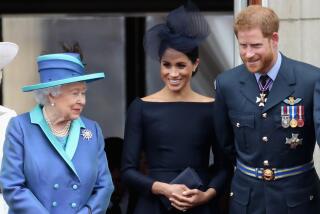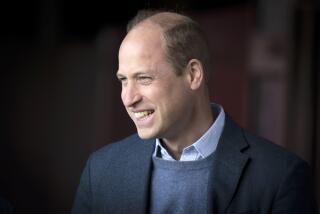His Soul-Searching Over, Edward Leaves Marines
- Share via
LONDON — After a week of widely publicized soul-searching, 22-year-old Prince Edward, fifth in line for the British throne, resigned Monday from the Royal Marines, breaking a century-old Royal Family tradition of military service.
“Prince Edward is leaving the marines with great regret but has concluded that he does not wish to make the service his long-term career,” Buckingham Palace said in a terse statement. “An announcement about his future plans is not expected for some time.”
The statement came after a weekend gathering of the royal family at Sandringham, northeast of London.
Edward, the youngest--some say the brightest--of Queen Elizabeth’s four children, quit four months into a 12-month officer training program that is one of the most grueling in the British armed forces.
He graduated from Cambridge last year with a more impressive academic record than either of his two older brothers, Prince Charles and Prince Andrew.
Edward’s father, Prince Philip, was a serving naval officer when he married Princess Elizabeth and reportedly gave up active duty with considerable regret after she became queen. Philip is said to have argued strenuously in a futile attempt to persuade Edward to reconsider.
Prince Charles served in the army, navy and air force and still holds the navy rank of commander. Prince Andrew, a navy helicopter pilot, fought in the Falklands War.
To some, Edward’s decision is viewed as reflecting the attitudes of a new generation now reaching adulthood in Britain, born into an era of relative affluence in the mid-1960s, well after the end of military conscription.
Edward’s decision has also raised questions about the tradition that royal sons should go into the military.
The Times of London recently asked, “Isn’t it about time some member of the Royal Family became involved in the manufacturing industry for a change?”
The idea that male members of the Royal Family should serve in the armed forces goes back more than a century. Originally, it was seen as a means of instilling discipline and countering any image of idleness.
While press speculation had focused on Edward’s alleged difficulties in meeting the physical challenge of the training, close friends indicated that he had concluded that a career in the armed forces would be too limiting intellectually.
In interviews with reporters Monday, Col. Ian Moore, the marine commander in charge of officer training, denied that Edward had had problems keeping up with the tough physical demands.
More to Read
Sign up for Essential California
The most important California stories and recommendations in your inbox every morning.
You may occasionally receive promotional content from the Los Angeles Times.













